Related Research Articles
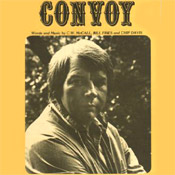
"Convoy" is a 1975 novelty song performed by C. W. McCall that became a number-one song on both the country and pop charts in the US and is listed 98th among Rolling Stone magazine's 100 Greatest Country Songs of All Time. Written by McCall and Chip Davis, the song spent six weeks at number one on the country charts and one week at number one on the pop charts. The song went to number one in Canada as well, hitting the top of the RPM Top Singles Chart on January 24, 1976. "Convoy" also peaked at number two in the UK. The song capitalized on the fad for citizens band (CB) radio. The song was the inspiration for the 1978 Sam Peckinpah film Convoy, for which McCall rerecorded the song to fit the film's storyline.

Canadian singer Shania Twain has released six studio albums, three compilation albums, three remix albums, one box set, two live albums, 45 singles, 38 music videos, six promotional singles, and made six guest appearances. Twain's repertoire has sold over 34 million albums in the United States alone, placing her as the top-selling female artist in country music. Moreover, with 48 million copies shipped, she is ranked as the 26th best-selling artist overall in the US, tying with Kenny G for the spot. She is also recognized as one of the best-selling music artists in history, selling over 100 million records worldwide and thus becoming the top-selling female artist in country music ever.
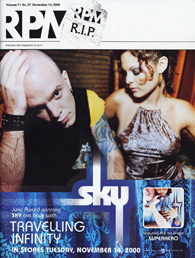
RPM was a Canadian music-industry publication that featured song and album charts for Canada. The publication was founded by Walt Grealis in February 1964, supported through its existence by record label owner Stan Klees. RPM ceased publication in November 2000.

"Tell It Like It Is" is a song written by George Davis and Lee Diamond and originally recorded and released in 1966 by Aaron Neville. In 2010, the song was ranked No. 391 on Rolling Stone magazine's list of The 500 Greatest Songs of All Time.

"Fly, Robin, Fly" is a song by the German disco group Silver Convention from their debut studio album Save Me (1975). Sylvester Levay and Stephan Prager wrote the song, and the latter produced it. "Fly, Robin, Fly" was released as the third single from Save Me in September 1975, reaching number one on the United States Billboard Hot 100. Thanks to the success of "Fly, Robin, Fly", Silver Convention became the second German act to have a number one song on the American music charts. The song received a Grammy Award for Best R&B Instrumental Performance in 1976.

"Lonely Night (Angel Face)" is a song written by Neil Sedaka. The song was first recorded by Sedaka and appeared as a track on his 1975 studio album, The Hungry Years. The following year the song was made popular when covered by the pop music duo Captain & Tennille, who took their version to number 3 on the Billboard Hot 100.

"Paloma Blanca", often called "Una Paloma Blanca", is a song written by Dutch musician George Baker and first recorded and released by his band, George Baker Selection. The single—the title track of the group's fifth album—was released in 1975 with "Dreamboat" as its B-side. The song was a hit throughout Europe, reaching No. 1 in Austria, Finland, Flanders, Germany, the Netherlands, Sweden and Switzerland, and it also topped the charts of New Zealand and South Africa.

"Then You Can Tell Me Goodbye" is a song written by John D. Loudermilk. It was first released in 1962 by Don Cherry, as a country song and again as a doo-wop in 1967 by the group The Casinos on its album of the same name, and was a number 6 pop hit that year. The song has since been covered by Eddy Arnold, whose version was a number 1 country hit in 1968, and by Neal McCoy, whose version became a Top 5 country hit in 1996.

"Say You Love Me" is a song written by English singer-songwriter Christine McVie for Fleetwood Mac's 1975 self-titled album. The song peaked at No. 11 on the Billboard Hot 100 for three weeks, and remains one of the band's most recognizable songs. Its success helped the group's eponymous 1975 album sell over eight million copies worldwide.
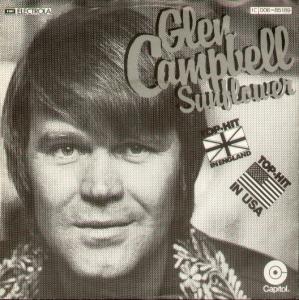
"Sunflower" is a song written by Neil Diamond and recorded by American country music singer Glen Campbell. It was released in June 1977 as the second single from Campbell's 1977 album, Southern Nights. "Sunflower" was the last of eight number ones on the Easy Listening chart for Campbell. The single spent one week at number one and peaked at number 39 on the Billboard Hot 100. "Sunflower" peaked at number four on the US country chart.
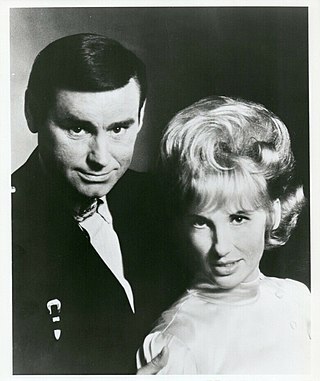
The discography of American country artists George Jones and Tammy Wynette contains the recordings they made as a vocal duo. Their discography includes nine studio albums, 14 compilation albums, 15 singles and one music video. In October 1971, the duo's first studio album was released by Epic Records and was titled We Go Together. It peaked at number three on the American Billboard Top Country Albums chart and number 169 on the Billboard 200 list. Included on the disc was the duo's first single, "Take Me". It reached the top ten on the American Billboard Hot Country Songs chart and the top 20 on the Canadian RPM Country Tracks chart. It was followed by their second studio album called Me and the First Lady, which charted at number six on the Billboard country list. Featured on the disc was their second top ten single, "The Ceremony".
"Liars One, Believers Zero" is a song written by Glenn Martin. It was first recorded by American country singer-songwriter Bill Anderson. It was released as a single in 1976 via MCA Records and became a major hit the following year.
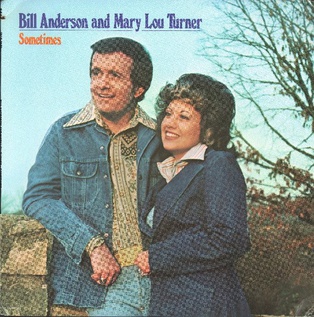
Sometimes is a studio album by American country music artists Bill Anderson and Mary Lou Turner. It was released in January 1976 on MCA Records and was produced by Owen Bradley. It was Anderson's twenty fourth studio recording and Turner's first. The album's title track became a major hit on the country charts in both the United States and Canada. The album also reached major positions on the country chart in the United States. Sometimes was the first collaborative project between Anderson and Turner. Anderson hired Turner to work as his duet partner during this period and the project was one of two recordings they made.

Peanuts and Diamonds and Other Jewels is a studio album by American country singer-songwriter Bill Anderson. It was released in September 1976 on MCA Records. It was co-produced by Owen Bradley and Buddy Killen. It was Anderson's twenty fifth studio recording released during his musical career and second to be released in 1976. The album included three singles issued between 1975 and 1976, two of which became major country hits in both the United States and Canada.

The discography of Asleep at the Wheel (AATW), an American country band, consists of 26 studio albums, 16 live albums, 21 compilation albums, seven extended plays (EPs), 40 singles, four video albums and 19 music videos.
Jack Hennig is a Canadian singer-songwriter. Hennig is best known for his Canadian hits "Lady Highway" (1976), "George the Hermit" (1978), "Mindy" (1978), and "Caught in the Middle" (1979). During the peak of his career between 1970 and 1980, Hennig placed nine songs on the Canadian RPM charts.
References
- Citations
- ↑ "RPM Country Playlist". RPM. Vol. 24, no. 23. March 6, 1976. p. 24.